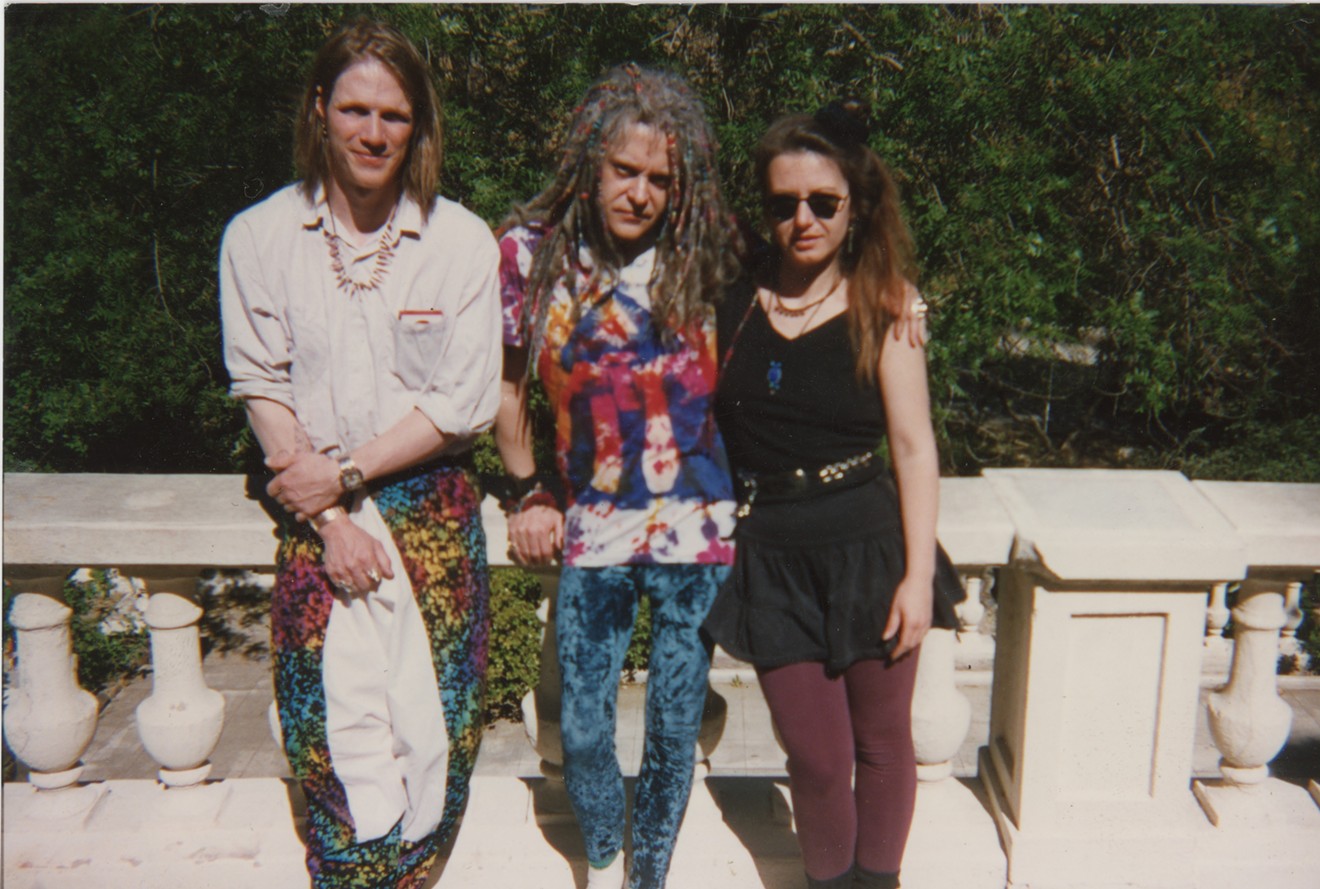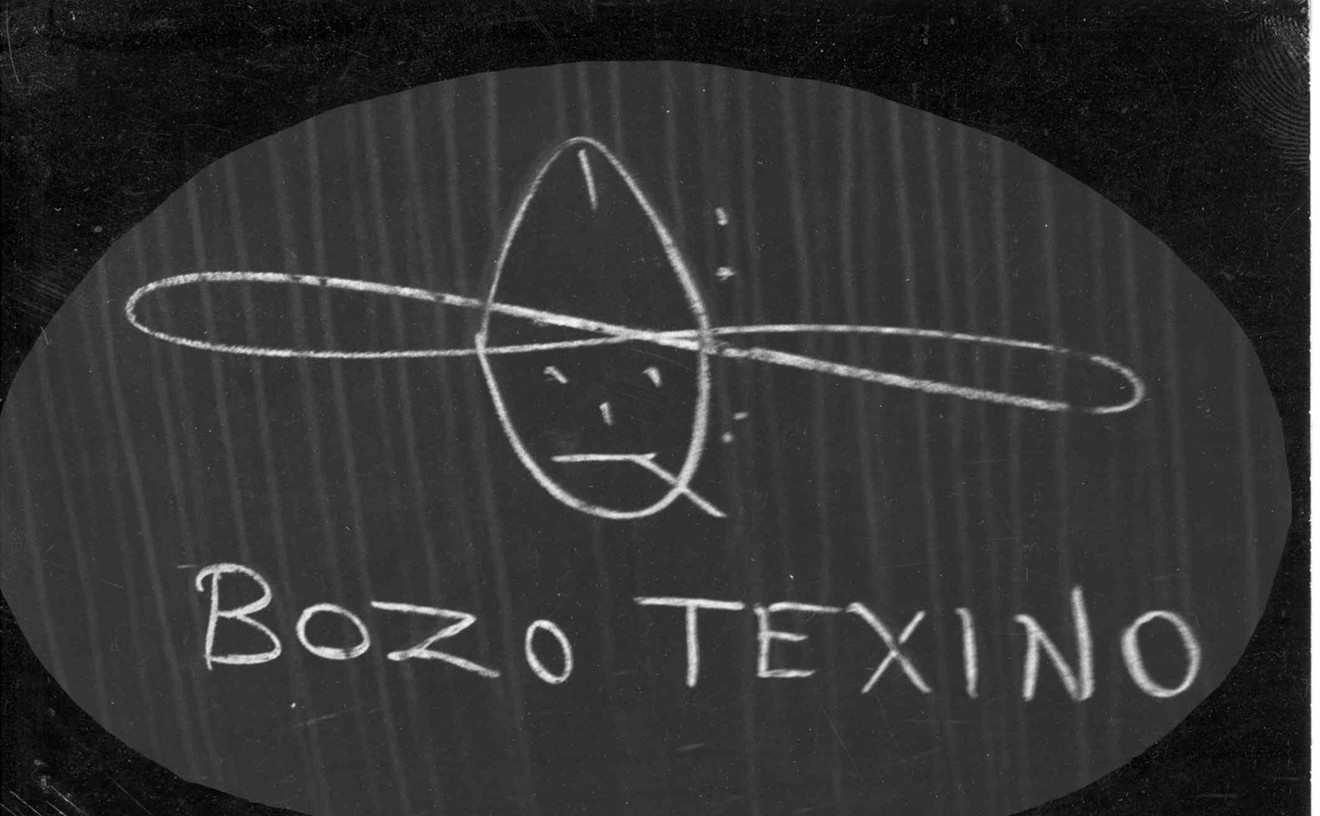This week, when Tom Banger visits his home town of Denver after spending years working for the government in Washington, D.C., he’s not looking for a punk family reunion.
He doesn’t want a bunch of old fogies from the ’80s blathering about the halcyon days of junkyard shows, vomit, drugs, semen-soaked magic rituals and that time Tom Headbanger — a moniker he has long since dropped — handed out painted bones as concert tickets. He doesn’t want to rehash the clashes between anarchist and Nazi punks, the tiffs between heteros and gays, and the times that druggies and straight-edge kids beat the shit out of each other — and him — when he was booking shows back in the day. He refuses to wax nostalgic.
Instead, now 57, he’s hoping to pass down his memories of ’80s counterculture to today’s youth, inspiring them just as hearing about the Beats moved him when he was young.
He’s going to preach to the next generation the virtues of Thee Temple ov Psychick Youth, an occult organization and bootleg metaphysical printing press tied to the avant-garde industrial video-art band Psychic TV — an organization he helped lead in 1986. That talk takes place at 8:23 p.m. on Wednesday, August 14, at Mutiny Information Cafe, 2 South Broadway. After that, Banger will offer a sigil-making workshop at the Mercury Cafe, 2199 California Street, at 2 p.m. Saturday, August 17, teaching people how to create sigils — symbolic representations of their desires — out of recycled video, tape recordings and writings, so that they can create the world they want through magick. He’ll keep instruction at a high level, he says, leaving out the parts about charging those sigils with energy from orgasms and consecrating them with sexual fluids, blood and hair, like he and the Psychick Youth did in the old days. And finally, at 6 p.m. Monday, August 19, he will regale Denver Public Library patrons with tales of his punk past, reminiscing about memorabilia he donated two decades ago to the Western History Collection. He wants to pass down solid information to young people facing an uncertain future, terrorized that Trump is shifting the United States toward totalitarianism — much as Banger feared Reagan would do back in the ’80s.
Because what could be more useful in combating today’s maladies than memories of slam-dancing kids with spiky hair, orgasm-frenzied rituals and drugs? Way too many drugs. Drugs that burned out and killed his contemporaries. Drugs that ended Banger’s run as “Denver’s first punk promoter” — a title he admits wasn’t accurate. Drugs he’s glad he survived by quitting punk and becoming a nonprofit worker and then a cybersecurity expert for a government agency he refuses to name.
Despite the omnipresence of all those drugs, that’s not what drew Banger to punk. It was the occult.
From his early years, he was obsessed with metaphysics. As a teenager, he read the works of Aleister Crowley, studied numerology, tarot and other mystical systems. All that served as a gateway to heavy metal, which drew him in with demonic imagery and rage. In ’81, he decided to become a heavy-metal promoter. He had seen others like Phil Bender — who went on to co-found Pirate Contemporary Art — booking punk shows in town, and Banger wanted to do something similar. So he made a flier with a barbarian with an ax lodged in a punk’s head and text that read: “It’s About Time. Headbanger Presents Heavy Metal.” But there was a problem: He couldn’t find metal bands willing to play for free, and all the acts he loved had huge production design and needed guarantees he could never afford.
Then he saw the marketing around the Dead Kennedys’ 1981 single “Nazi Punks Fuck Off,” and decided that punk was heavier than metal, the culture was scrappier, and bands, conveniently, were willing to play for free or dirt cheap, because so few venues were booking them. Banger began throwing shows in fraternal lodges; 3:2 bars, where eighteen-year-olds could drink; empty warehouses with busted pipes, leaking ceilings and ice on the floor; and living rooms — long before that was trendy. Through the early to mid-’80s, he booked Sonic Youth, The Misfits and a legendary junkyard show with Einstürzende Neubauten.
Cops would show up. Fights would break out. There was no telling what mayhem might erupt at a Headbanger Presents concert.
“Meanwhile, there started to be a lot of factions in the scene,” he recalls. “I tried to cross as many of those communities as I could. I was the hub for a lot of those communities — different schools, different ages, different types of music.” Even so, violence spread. At one of his own concerts, he tried to break up a fight and wound up on the bottom of a pile of boots and fists. He walked home bloodied, broken and gun-shy about throwing more shows.
So Banger opened a video art gallery, where he had a wall of TVs, two 16mm film projectors and slide projectors: a scrappy setup to showcase art that was as underground as the music he supported. While he was running that space, he received a call about putting on a Psychic TV concert. He liked the idea, but didn’t have the money. Still wanting to befriend the musicians — particularly Genesis P-Orridge, who had once been a member of Throbbing Gristle, a band he loved in his high school years — Banger asked to join Psychic TV on tour, offering his gallery’s video equipment to the band. The members agreed.
He encouraged them to put together a direct mailing list in advance of the tour, and they hired him to create it and send out information. From that start, he formed the North American Chapter of P-Orridge’s Thee Temple ov Psychick Youth, an occult organization inspired by Brion Gysin, William Burroughs, Crowley and Austin Osman Spare. “On October 12, Aleister Crowley’s birthday in 1986, we had a psychotic opening at Thee Temple ov Psychick Youth,” Banger recalls. “We took datura.” That’s a toxic nightshade plant used in magical rituals that causes people to see things that aren’t there, vomit and fall into seizures — on a good day. Datura overdoses are common. “People lost their freakin’ minds,” he recalls.
Over the next four years, Banger and the North American chapter of TOPY did much more than datura. They bootlegged movies by Mexican avant-garde filmmaker Alejandro Jodorowsky, pirated out-of-print occult texts, and published more than fifty works, mailing all of it to a list of 3,000 people. The literature popularized piercing, tattooing and scarification, and helped revitalize do-it-yourself chaos magic, encouraging people to build their own mystical systems.
As the group grew, offshoots started in cities around the United States and Canada. Some split and factions formed.
In the early ’90s, police raided the Brighton, England, home of P-Orridge, who had left that country to do humanitarian work. The cops accused the artist of child pornography. The charges didn’t stick; the suspect video turned out to be an experimental film depicting adults involved in sexual rituals. Around that time, Banger left the organization. “I think it’s cool I actually got out,” he says. “Most people I know from those times are kind of trapped in a way, and I made it.”
For several years, Banger made a living as a sound engineer. In 1999, he was working gigs and musicians were yelling at him that their ukulele wasn’t loud enough. He quit and got a respectable job, even if he can’t tell you about it. “I was like, ‘I don’t want to be doing this when I’m fifty,’” he says. “So I’m not.”
But he is looking back — not with nostalgia, but with hope that his memories can help younger people figure out how to navigate an uncertain future. “In this age when people think that Donald Trump is the Antichrist or the Messiah, people are worried about surveillance and worried about privacy, and they’re trying to find ways to connect with their communities in a way that’s more real. I think TOPY is a good model for it,” Banger says. “We dealt with a lot of the same problems, but at a much slower pace.”
[
{
"name": "Air - MediumRectangle - Inline Content - Mobile Display Size",
"component": "12017618",
"insertPoint": "2",
"requiredCountToDisplay": "2"
},{
"name": "Editor Picks",
"component": "17242653",
"insertPoint": "4",
"requiredCountToDisplay": "1"
},{
"name": "Inline Links",
"component": "18838239",
"insertPoint": "8th",
"startingPoint": 8,
"requiredCountToDisplay": "7",
"maxInsertions": 25
},{
"name": "Air - MediumRectangle - Combo - Inline Content",
"component": "17261320",
"insertPoint": "8th",
"startingPoint": 8,
"requiredCountToDisplay": "7",
"maxInsertions": 25
},{
"name": "Inline Links",
"component": "18838239",
"insertPoint": "8th",
"startingPoint": 12,
"requiredCountToDisplay": "11",
"maxInsertions": 25
},{
"name": "Air - Leaderboard Tower - Combo - Inline Content",
"component": "17261321",
"insertPoint": "8th",
"startingPoint": 12,
"requiredCountToDisplay": "11",
"maxInsertions": 25
}
]













